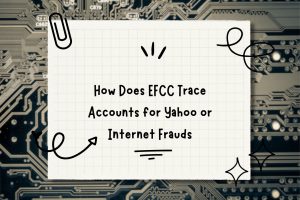The rise of internet fraud in Nigeria has brought about a concerning trend, leaving many unsuspecting individuals vulnerable to the deceitful tactics employed by scammers.
These fraudulent activities encompass a wide range of ploys, including phishing emails, counterfeit websites, and social engineering, all of which can have severe repercussions, from financial devastation to identity theft.
To combat internet fraud in Nigeria, it’s crucial to familiarize oneself with the different types of scams that exist and how to identify them.
The notorious “419” or advance fee fraud, for instance, lures victims with the promise of a substantial sum of money in exchange for a small initial payment.
Another type is the phishing scam, where the scammer sends an email or message that appears to be from a legitimate company or organization, aiming to extract personal information such as passwords or credit card details.
In the following discourse, we will explore ways to stop internet fraud in Nigeria. This will entail practical measures that you can take to protect yourself from fraudsters and avoid falling victim to their schemes. By heeding these tips, you can safeguard your personal information and prevent financial harm.
What is Internet Fraud in Nigeria

Internet fraud, also known as “419” or “Yahoo Yahoo”, is a major problem in Nigeria. It involves using the internet to deceive individuals or organizations in order to obtain money or other valuable assets.
Internet fraud in Nigeria encompasses a wide array of deceptive practices carried out by scammers to exploit unsuspecting individuals. These fraudulent activities include phishing emails, advance fee fraud, and various other schemes designed to deceive and swindle victims.
The perpetrators often employ sophisticated tactics to masquerade as legitimate entities, luring individuals into divulging sensitive information or parting with their money under false pretenses.
This pervasive issue poses a significant threat, leading to severe consequences such as financial loss and identity theft.
It’s essential to remain vigilant and informed about the prevalent types of internet fraud in Nigeria to safeguard oneself from falling victim to these deceitful schemes.
Types of Internet Fraud
There are various types of internet fraud prevalent in Nigeria, some of which include:
- Phishing scams: This involves sending fraudulent emails or messages to individuals, asking them to provide sensitive information such as bank account details, passwords, and credit card information.
- Business email compromise (BEC): This involves impersonating a company executive or employee to trick others in the company into transferring money or providing sensitive information.
- Romance scams: This involves creating fake profiles on dating websites or social media platforms to trick individuals into sending money or gifts.
Common Tactics Used by Fraudsters
Fraudsters in Nigeria use various tactics to deceive their victims. Some of the common tactics include:
- Urgency: Fraudsters often create a sense of urgency to pressure their victims into making quick decisions without thinking them through.
- Social engineering: This involves manipulating individuals into divulging sensitive information or taking actions that are not in their best interest.
- Impersonation: Fraudsters often pretend to be someone else, such as a bank representative or a government official, to gain the trust of their victims.
To avoid falling victim to internet fraud, it is important to be vigilant and cautious when using the internet. Always verify the authenticity of emails, messages, and phone calls before providing any sensitive information.
Additionally, it is important to report any suspected cases of internet fraud to the appropriate authorities.
Preventive Measures and Solutions
Strengthening Legal Frameworks
To effectively combat internet fraud in Nigeria, it is crucial to have a strong legal framework that can effectively prosecute offenders. The Nigerian government must enact and enforce laws that criminalize internet fraud and impose severe penalties on perpetrators. The laws should also provide for the seizure of assets acquired through fraudulent means.
Enhancing Cybersecurity Infrastructure
Another way to prevent internet fraud is to enhance the country’s cybersecurity infrastructure. This can be achieved by investing in modern technologies and tools that can detect and prevent cyber threats. The government should also collaborate with private sector organizations to develop and implement cybersecurity policies and standards.
Public Awareness and Education
Public awareness and education are essential in preventing internet fraud in Nigeria. The government should launch campaigns to educate citizens on the dangers of internet fraud and how to avoid falling victim to it. This can be achieved through the use of various media, including television, radio, and social media platforms.
International Cooperation and Partnerships
The fight against internet fraud in Nigeria is not just a local issue but a global one. The Nigerian government should work closely with international organizations and law enforcement agencies to combat this issue. This can be achieved through information sharing, joint investigations, and the extradition of suspects.
How You Can Stop Internet Fraud in Nigeria
- Stay Informed: Keep yourself updated on the various types of internet fraud prevalent in Nigeria, such as advance fee fraud and phishing scams.
- Verify Sources: Always verify the authenticity of emails, websites, and individuals before sharing any personal or financial information.
- Secure Passwords: Use strong, unique passwords for online accounts and enable two-factor authentication where possible.
- Educate Others: Spread awareness about internet fraud and educate friends and family about the common tactics used by scammers.
- Report Suspicious Activity: If you encounter any suspicious online activity or believe you have been targeted by a scam, report it to the appropriate authorities or your bank.
- Use Secure Networks: When conducting online transactions, ensure that you are using a secure and trusted network to minimize the risk of unauthorized access.
- Be Skeptical: Approach unsolicited offers or requests for personal information with skepticism, and don’t hesitate to seek advice from trusted sources before proceeding.
By implementing these preventive measures and solutions, Nigeria can effectively combat internet fraud and protect its citizens from falling victim to it.






